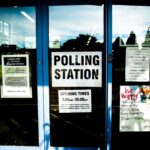Story of Moses Tai
I grew up on the Huruma Estate in Eldoret, Kenya’s fifth largest town, where I spent my childhood in the 80s. Situated at high altitude, Eldoret is well reputed for producing world-beating, record-breaking, and Olympic-standard runners. However, away from the limelight, poverty in Kenya was rife. As a child, I remember wondering why I did not have access to a safe space to play – a playground. We had to make do with whatever open space we could find to play, sometimes on streets covered with rotting garbage and raw sewage, and busy with people and cars.
The Awakening
As I got older, I never stopped thinking about the lack of access to child-friendly facilities in my community. When I became more politically aware in my youth in the 90s, it occurred to me that the reason there was no playground in my community (and other communities) is the same reason there was lack of access to essential services such as clean water and safe sanitation hygiene (WASH). It was due to the poor choices that had been made in the management of public resources.
So, I made it my mission to rally the community to explore ways in which we could collectively take a more active role in public spending decisions. However, it soon became apparent that people in my community had lost hope, they believed things would never change. I was told that I was naive for believing I could change something that couldn’t be changed. This is when I realised that as long as communities had low expectations, things would always remain the same.
People’s lived experiences shape their beliefs. Their beliefs shape their expectations. And their expectations shape their realities.
The Turning Point
Just before I left Kenya in January 2008 for further studies in the UK, there was an eruption of post-election violence across the country caused by disputed elections. Eldoret and surrounding areas became the epicentre of the inter-ethnic clashes. I was traumatised by what I witnessed in my community: people attacking each other with machetes and bows and arrows, torched houses reduced to smouldering ashes, dead bodies lying in the streets slashed with machetes or shot with arrows.
To me, the violence was the result of failure to address the poor choices in the management of public resources, which goes to the root of electoral disputes and inter-ethnic conflicts. This experience triggered a very strong resolve in me to find a way through which communities and leaders can be empowered to make better choices about how public resources are managed.
The Conception
As I developed my approach to sustainable change through ten years of writing and research, Kenya passed a new constitution in 2010. A crucial pillar of the 2010 Kenyan Constitution is to encourage public participation in the country’s decision-making processes. However, studies show that one of the biggest challenges preventing participation is lack of capacity by communities to participate. This lack of capacity is caused by low expectations of what can be achieved when public resources are better managed. Community expectations have been crushed by the historical mismanagement of public resources and lack of access to essential services.
It doesn’t matter that public participation is now a constitutional requirement; if communities don’t expect things to change, they will not participate and therefore, things will not change.
In order to raise expectations, it is necessary to set new and better precedents in the transparent, accountable and efficient management of public resources and access to essential services. This is how African Development Choices (ADC) was conceived in 2018. With the belief that by setting better precedents, raising expectations and increasing participation, communities and leaders could make better choices about how public resources are managed, and poverty could be reduced and conflicts avoided.
African Development Choices’ Perspective
By delivering access to essential services through our projects, we set better precedents and mobilise communities to enact change for themselves. We share information from our projects that provides a new perspective; but it’s not the information that empowers communities to participate, it’s raised expectations from a new perspective. This candid but highly effective approach will ensure the biggest impact on poverty reduction and enable sustainable change.
The choices we make are based on the information we have. With access to better information, we can make more informed choices about the things that affect our lives.
Moses Tai officially registered ADC as a social enterprise in the UK in 2019 and today, we are using our unique approach to empower communities to create real, lasting change. You can join our cause, visit the Get Involved page on our website to learn more and become part of the change.












0 Comments